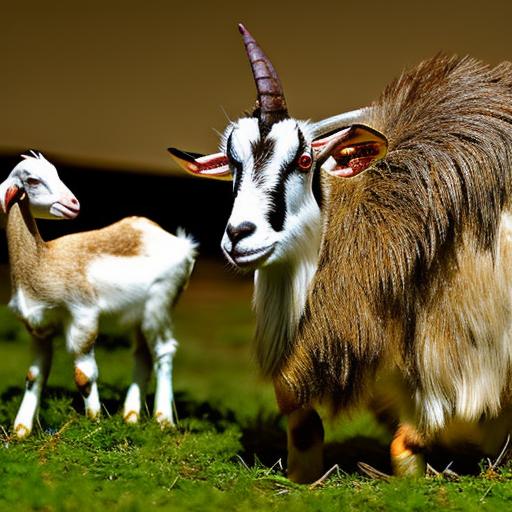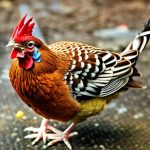Keeping goats and chickens together is a popular practice among small-scale farmers and homesteaders. It offers several benefits, including increased efficiency in space and resources, improved soil quality, and mutual benefits for both animals. While there are some factors to consider before co-housing goats and chickens, with proper planning and management, it is possible to create a harmonious environment for both species.
Key Takeaways
- Keeping goats and chickens together is possible and can have benefits for both animals and their owners.
- Benefits of keeping goats and chickens together include pest control, fertilizer production, and reduced feed costs.
- Factors to consider before keeping goats and chickens together include space requirements, breed compatibility, and potential health risks.
- Housing requirements for goats and chickens include separate sleeping areas and secure fencing to prevent escape or predation.
- Feeding requirements for goats and chickens vary, but both animals require access to fresh water and appropriate feed.
Benefits of Keeping Goats and Chickens Together
One of the main benefits of keeping goats and chickens together is the mutual benefits for both animals. Chickens can help control pests such as ticks and fleas on the goats, while goats can provide protection for the chickens by deterring predators. Additionally, goats can help keep the grass and weeds in check, creating a more manageable environment for the chickens.
Another benefit is the increased efficiency in space and resources. By co-housing goats and chickens, farmers can make the most of their available land. The goats can graze on the grass while the chickens can forage for insects and other small organisms. This allows for a more sustainable use of resources and reduces the need for additional inputs.
Furthermore, keeping goats and chickens together can improve soil quality. Goats naturally fertilize the soil with their manure, which is rich in nutrients. This can benefit the plants in the area, including the grass that the goats graze on. The chickens also contribute to soil health by scratching and pecking at the ground, which helps aerate it and distribute nutrients.
Factors to Consider Before Keeping Goats and Chickens Together
Before deciding to keep goats and chickens together, there are several factors to consider. First, it is important to check local zoning laws and regulations to ensure that co-housing these animals is allowed in your area. Some areas may have restrictions or require permits for keeping livestock.
Compatibility of goat and chicken breeds is another factor to consider. Some goat breeds may be more aggressive towards chickens, while others may be more tolerant. It is important to choose goat breeds that are known to coexist well with chickens. Similarly, certain chicken breeds may be more resilient and better able to handle the presence of goats.
Available space and resources should also be taken into account. Both goats and chickens require adequate space to roam and access to fresh water and food. It is important to ensure that there is enough space for both species and that they have separate areas for feeding and watering.
Lastly, keeping goats and chickens together requires a time commitment. Both animals require regular care and attention, including feeding, watering, and cleaning. It is important to assess whether you have the time and resources to properly care for both species.
Housing Requirements for Goats and Chickens
When co-housing goats and chickens, there are several housing options to consider. One option is to provide separate housing for each species. This can be done by building separate structures or using existing buildings such as barns or sheds. Separate housing allows for better control over the animals’ environment and reduces the risk of disease transmission.
Another option is co-housing goats and chickens in the same structure. This can be done by partitioning off separate areas within a larger building or using movable fencing to create separate spaces. Co-housing can help save space and resources, but it requires careful planning to ensure that both species have enough room and access to their specific needs.
Regardless of the housing option chosen, proper ventilation and sanitation are crucial. Good ventilation helps prevent the buildup of moisture and ammonia, which can lead to respiratory issues in both goats and chickens. Regular cleaning and disinfection of the housing area is also important to prevent the spread of disease.
Feeding Requirements for Goats and Chickens
Goats and chickens have different dietary needs, so it is important to provide proper nutrition for both animals. Goats are ruminants and require a diet that is high in fiber, such as grass and hay. They also benefit from supplemental grains and minerals. Chickens, on the other hand, require a diet that is high in protein, such as grains and insects.
When co-housing goats and chickens, it is important to provide separate feeding stations to ensure that each species gets the appropriate food. This can be done by using separate feeders or by feeding the animals at different times. It is also important to provide fresh water for both species at all times.
An alternative option is to feed both animals together by using a mixed ration that meets the nutritional needs of both goats and chickens. This can be achieved by working with a nutritionist or using commercially available feeds that are formulated for multiple species. However, it is important to monitor the animals’ health and adjust the feeding program as needed.
Health Concerns When Keeping Goats and Chickens Together

When co-housing goats and chickens, there is a risk of disease transmission between the two species. Goats can be carriers of certain diseases that can be harmful to chickens, such as coccidiosis and salmonella. Similarly, chickens can carry diseases that can affect goats, such as avian influenza.
To minimize the risk of disease transmission, it is important to practice good biosecurity measures. This includes regular health checks and vaccinations for both goats and chickens. It is also important to keep the housing areas clean and free from feces and other potential sources of contamination.
Common health issues to watch out for include respiratory infections, parasites, and nutritional deficiencies. Regular monitoring of the animals’ health and behavior can help identify any potential issues early on. It is important to consult with a veterinarian if any health concerns arise.
Managing Flock Dynamics: Goats and Chickens
Understanding the natural behaviors of goats and chickens is important when co-housing them. Goats are social animals that establish a pecking order within their herd. Chickens also have a pecking order within their flock. It is important to allow these natural behaviors to occur and not interfere unless there is excessive aggression or bullying.
To manage conflicts between goats and chickens, it is important to provide enough space and resources for both species. This includes providing separate feeding and watering stations, as well as enough space for each animal to move around comfortably. It may also be helpful to provide enrichment activities, such as toys or perches, to keep the animals occupied and reduce boredom-related aggression.
Common Problems When Keeping Goats and Chickens Together
One common problem when keeping goats and chickens together is the risk of predation. Both goats and chickens are vulnerable to predators such as foxes, coyotes, and raccoons. It is important to take measures to protect both species, such as using secure fencing, locking up the animals at night, and providing sheltered areas for them to retreat to.
Another problem that can arise is overcrowding. If there are too many animals in a confined space, it can lead to stress, disease transmission, and reduced overall health. It is important to assess the carrying capacity of the land and ensure that there is enough space for both goats and chickens to roam comfortably.
Regular maintenance and upkeep are also important when co-housing goats and chickens. This includes cleaning the housing areas regularly, checking fences for any damage or weaknesses, and monitoring the animals’ health and behavior. By staying on top of maintenance tasks, potential problems can be identified and addressed before they become major issues.
Tips for Successful Integration of Goats and Chickens
To successfully integrate goats and chickens, it is important to introduce new animals slowly and carefully. This allows them to become familiar with each other’s presence without causing undue stress or aggression. It may be helpful to use temporary fencing or barriers to separate the animals initially and gradually allow them to interact.
Providing separate feeding and watering stations is also important to prevent competition and ensure that each species gets the appropriate nutrition. This can be done by using separate feeders and waterers or by feeding the animals at different times.
Creating a safe and comfortable environment for both animals is crucial. This includes providing adequate shelter, protection from predators, and enough space for each animal to move around freely. It may also be helpful to provide enrichment activities, such as perches or toys, to keep the animals mentally stimulated.
Is It Possible to Keep Goats and Chickens Together?
In conclusion, keeping goats and chickens together can offer several benefits, including mutual benefits for both animals, increased efficiency in space and resources, and improved soil quality. However, there are several factors to consider before co-housing goats and chickens, including local zoning laws, compatibility of breeds, available space and resources, and time commitment.
Proper housing, feeding, and health management are crucial when co-housing goats and chickens. It is important to provide separate housing options or carefully plan co-housing arrangements to ensure that both species have their specific needs met. Feeding requirements should be tailored to the dietary needs of each animal, and health concerns should be addressed through regular checks and vaccinations.
Managing flock dynamics and addressing common problems such as predation and overcrowding are important for the successful integration of goats and chickens. By following these tips and guidelines, it is possible to create a harmonious environment for both species. While there may be challenges along the way, with proper planning and management, keeping goats and chickens together can be a rewarding experience for small-scale farmers and homesteaders.
If you’re considering keeping goats and chickens together, it’s important to understand the dynamics and requirements of both animals. To ensure a harmonious coexistence, it’s crucial to provide them with suitable living conditions. One aspect to consider is the design of your chicken coop. In an informative article by Poultry Wizard, they discuss the importance of a well-designed chicken coop and nest box. This article provides valuable insights into creating a comfortable and secure environment for your chickens. To learn more about this topic, check out the article here.
FAQs
What are the benefits of keeping goats and chickens together?
Keeping goats and chickens together can be beneficial for both animals. Goats can help control weeds and brush, while chickens can help control insects and pests. Additionally, their manure can be used as fertilizer for gardens and crops.
Can goats and chickens share the same living space?
It is not recommended to house goats and chickens together in the same living space. Goats require more space and different types of shelter than chickens. Additionally, goats may accidentally harm or kill chickens due to their size and strength.
Can goats and chickens share the same pasture?
Yes, goats and chickens can share the same pasture as long as it is large enough to accommodate both species. However, it is important to provide separate areas for each species to retreat to if needed.
What should I feed my goats and chickens?
Goats and chickens have different dietary needs. Goats require hay, grains, and fresh water, while chickens require a balanced diet of grains, protein, and calcium. It is important to provide each species with their specific dietary needs to ensure their health and well-being.
Do goats and chickens get along?
Goats and chickens can coexist peacefully, but it is important to introduce them slowly and monitor their interactions. Goats may try to playfully headbutt or chase chickens, which can cause stress or injury. Additionally, chickens may peck at goats, which can also cause harm.
Meet Walter, the feathered-friend fanatic of Florida! Nestled in the sunshine state, Walter struts through life with his feathered companions, clucking his way to happiness. With a coop that’s fancier than a five-star hotel, he’s the Don Juan of the chicken world. When he’s not teaching his hens to do the cha-cha, you’ll find him in a heated debate with his prized rooster, Sir Clucks-a-Lot. Walter’s poultry passion is no yolk; he’s the sunny-side-up guy you never knew you needed in your flock of friends!







